News
Published 11 March 2021Researchers and scholars elected to Academy
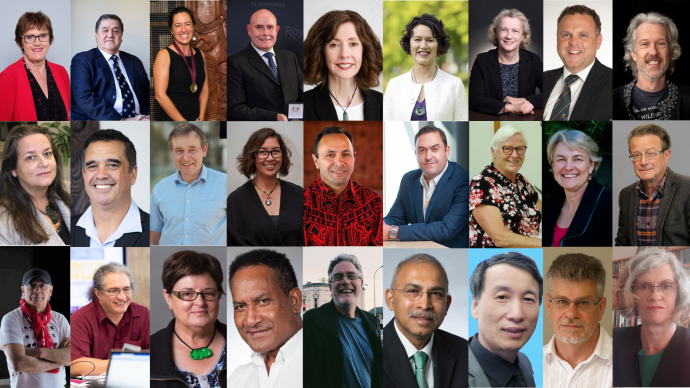
Twenty-seven new Ngā Ahurei a Te Apārangi Fellows and Ngā Ahurei Honore a Te Apārangi Honorary Fellows have been elected to the Academy of the Royal Society Te Apārangi for their distinction in research and advancement of science, technology or the humanities. They are exceptional leaders in their communities and their areas of research and scholarship.
Being made a Fellow is an honour that recognises distinction in research, scholarship or the advancement of knowledge at the highest international standards. Fellows can use the post-nominal ‘FRSNZ’ after their name to indicate this honour.
Chair of the Academy Executive Committee Professor Charlotte Macdonald FRSNZ says it was pleasing to see a large cohort of Fellows elected this year, all with such exceptional expertise.
“The newly-elected Fellows have made amazing contributions to knowledge in their fields and across disciplinary boundaries. Their election adds significantly to the breadth of knowledge held within the Academy; they will help support the purpose of Te Apārangi to engage with and inform New Zealanders on topics important to all.”
“On behalf of the Academy and Society, I heartily congratulate all the new Fellows. The election process is rigorous and new Fellows can be rightfully proud that their outstanding achievements have been recognised by their peers in this way.”
The new Fellows will be formally inducted at an event in Whanganui-a-Tara Wellington on 29 April. Photos are now available from the induction event.
They are the 2020 cohort, announced in 2021.
The new Fellows are:
- Professor Doug Armstrong, Massey University
- Professor Helen Moewaka Barnes, Massey University
- Professor Deidre Brown, University of Auckland
- Professor Charles Eason, Lincoln University
- Dr Susan Gardiner, Plant & Food Research
- Distinguished Professor Neil Gemmell, University of Otago
- Professor Gail Gillon, University of Canterbury
- Professor Jarrod Haar, Auckland University of Technology
- Garth Harmsworth, Manaaki Whenua - Landcare Research
- Professor Rawinia Higgins, Victoria University of Wellington –Te Herenga Waka
- Professor Andrew Hill, University of Auckland, Middlemore Hospital
- Professor Patria Hume, Auckland University of Technology
- Professor Robert Jahnke, Massey University
- Professor Robin Kearns, University of Auckland
- Dr Rangi Matamua
- Professor Janet McLean, University of Auckland
- Professor Julian Paton, University of Auckland
- Professor Steven Ratuva, University of Canterbury
- Professor Poia Rewi, University of Otago
- Associate Professor Damon Salesa, University of Auckland
- Professor Caroline Saunders, Lincoln University
- Distinguished Professor Graham Hingangaroa Smith, Massey University
- Professor Michelle Thompson-Fawcett, University of Otago
- Professor Denise Wilson, Auckland University of Technology
- Professor Zhi-Qiang Zhang, Manaaki Whenua - Landcare Research
The Society also announced the election of two Ngā Ahurei Honore a Te Apārangi Honorary Fellows. The election of Honorary Fellows aims to encourage strong ties with leading international scientists and scholars and New Zealand’s research community.
The new Honorary Fellows are:
- Professor Penelope Brothers, Australian National University, Australia
- Distinguished Professor Ravendra (Ravi) Naidu, University of Newcastle, Australia
Read more on the new Fellows:
Professor Doug Armstrong, Professor in Conservation Biology, Massey University Manawatū
Professor Doug Armstrong is recognised as a key player behind New Zealand’s reputation as a world leader in the field of restoration 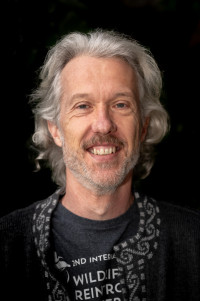 ecology and reintroduction biology. He is internationally renowned for his expertise in conservation and wildlife management. His research focuses on improving methods for understanding population and metapopulation dynamics of threatened wildlife. With over three decades of academic achievement, he has influenced policy and practices internationally in a number of fields within ecology and conservation biology. His most notable impact has been on reintroduction programmes, specifically bird reintroduction. This work directly influenced the New Zealand government’s goal of Predator Free New Zealand by 2050. Not only is his work helping to save many of Aotearoa’s species from extinction, but he has created conceptual models that have been applied to organisms at-risk across the globe. In addition to being an academic at the forefront of his field, he has dedicated his career to the development and support of postgraduate and early career researchers, many of whom are emerging as conservation leaders themselves.
ecology and reintroduction biology. He is internationally renowned for his expertise in conservation and wildlife management. His research focuses on improving methods for understanding population and metapopulation dynamics of threatened wildlife. With over three decades of academic achievement, he has influenced policy and practices internationally in a number of fields within ecology and conservation biology. His most notable impact has been on reintroduction programmes, specifically bird reintroduction. This work directly influenced the New Zealand government’s goal of Predator Free New Zealand by 2050. Not only is his work helping to save many of Aotearoa’s species from extinction, but he has created conceptual models that have been applied to organisms at-risk across the globe. In addition to being an academic at the forefront of his field, he has dedicated his career to the development and support of postgraduate and early career researchers, many of whom are emerging as conservation leaders themselves.
Professor Armstrong wishes to emphasise that conservation is a highly collaborative endeavour, and that the activities described above have resulted from collaborations with many students, colleagues, government departments, NGOs, community groups, landowners and iwi. While there are too many people and organisations to list individually, he wishes to particularly acknowledge the long-term contributions of John Ewen, John Perrot, Elizabeth Parlato, Kevin Parker, Isabel Castro, Phil Seddon, Ron Brooks, the New Zealand Department of Conservation, Auckland Regional Council, Supporters of Tiritiri Matangi Inc, Bushy Park Trust, Algonquin Park Wildlife Research Station, Robyn Peacocke, Tiroa & Te Hape Trusts, Maraeroa C Inc, Ngāti Rereahu, Ngāti Rangi, Ngā Rauru, Ngāti Manuhiri, Ngātiwai and Te Arawa.
Professor Helen Moewaka Barnes, Te Kapotai, Ngāpuhi-nui-tonu, Director of Whāriki and Co-director of the SHORE and Whariki Research Centre
Professor Helen Moewaka Barnes (Te Kapotai, Ngāpuhi-nui-tonu) has had a 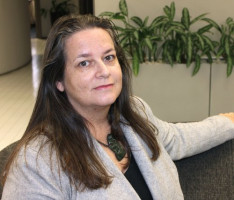 significant international impact in the field of Indigenous peoples' health and wellbeing. Her work is at the forefront of creating new knowledge in the determinants of health, wellbeing and mātauranga Māori, particularly in human and environmental relationships. She co-founded the Whāriki Research Group and has worked tirelessly with allied researchers to shift the research surrounding Māori health to focus on rangatiratanga and hauora rather than what makes them sick. These ideas about Māori advancement rather than development are now widely taken up. She engages with community partners, colleagues and students to build research programmes that emphasise and work with community based mātauranga to determine local to global actions. Throughout her research career, she has made immense contributions to the development of mātauranga Māori, with innovations such as Te Huihuinga, a hui-based methodology, and A Wairua Approach, a methodology for explicitly including wairua as part of the research frame. She has tackled significant issues to Māori communities such as environmental degradation, the importance of spirituality, alcohol harm, and racism. Throughout her research career, Helen has demonstrated strong leadership and sustained contribution to advancing mātauranga in social research.
significant international impact in the field of Indigenous peoples' health and wellbeing. Her work is at the forefront of creating new knowledge in the determinants of health, wellbeing and mātauranga Māori, particularly in human and environmental relationships. She co-founded the Whāriki Research Group and has worked tirelessly with allied researchers to shift the research surrounding Māori health to focus on rangatiratanga and hauora rather than what makes them sick. These ideas about Māori advancement rather than development are now widely taken up. She engages with community partners, colleagues and students to build research programmes that emphasise and work with community based mātauranga to determine local to global actions. Throughout her research career, she has made immense contributions to the development of mātauranga Māori, with innovations such as Te Huihuinga, a hui-based methodology, and A Wairua Approach, a methodology for explicitly including wairua as part of the research frame. She has tackled significant issues to Māori communities such as environmental degradation, the importance of spirituality, alcohol harm, and racism. Throughout her research career, Helen has demonstrated strong leadership and sustained contribution to advancing mātauranga in social research.
Professor Deidre Brown, Ngāpuhi, Ngāti Kahu, University of Auckland
Professor Deidre Brown (Ngāpuhi, Ngāti Kahu) is the founding researcher of
Māori architectural history and design. Her leading research has been used as a framework in the field of Māori architecture within Aotearoa and internationally. While working to recover histories and taonga in her own Taitokerau (Northland) region, she challenged earlier scholars who argued that the region’s woodcarving traditions died out with Pākehā arrival. She discovered what were previously deemed as “lost” collections of Māori art, leading to the repatriation of a significant taonga (Te Pahi medal), which enabled her hapū to return to their tūrangawaewae tribal lands. She is an internationally-renowned and recognised scholar of Māori and Pacific art history, cultural property rights and Indigenous digital humanities, and one of the first researchers to develop scholarship and Kaupapa Māori methodology for investigating Indigenous digital culture. Throughout her research career, she has been committed to protecting Māori intellectual and cultural property rights in artistic and commercial sectors. She co-authored Art in Oceania: a new history – a major comprehensive survey of cultural production for the region, supported by the Marsden Fund, which won the 2014 Art Book Prize for the best English language art or architecture book in the world. Other Marsden-funded book projects include A New Zealand Book of Beasts: animals in our culture, history and everyday life from 2013 with Professors Annie Potts and Philip Armstrong and the soon to published Toi Te Mana: a history of Indigenous art from Aotearoa New Zealand with Associate Professor Ngarino Ellis and the late Professor Jonathan Mane-Wheoki. The latter is a comprehensive account of the history of Māori art and architecture and draws together many of her career’s research interests.
Whāia te iti kahurangi ki te tūohu koe me he maunga teitei.
Seek the treasure you value most dearly and if you bow your head, let it be to a lofty mountain.
Professor Charles Eason CNZM CRSNZ, Lincoln University, Senior Science Strategy and R&D Advisor at Wakatū Incorporation
Charles is internationally recognised as a leader in toxicology and 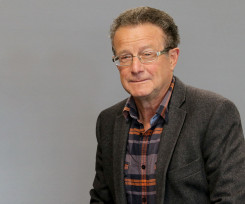 biotechnology. He has successfully delivered new drugs and safer pest control. Charles pioneered “red blood cell toxicants” and R&D leading to the registration of the lead compound in this class for stoat control in New Zealand. This was the first of its kind and was explicitly designed with humaneness as a focus. This and other products have made a material difference nationally in the creation of predator-free zones. New Zealand’s fauna would not be as secure as it is today without his work. He is recognised as a key player behind New Zealand’s global reputation as a leader in the protection of endangered species. With several humane, low residue target- specific pest control products on the market, his research on these new, and traditional tools, has also had a lasting impact on how rodenticides can be used more carefully to protect threatened species across the globe. Early in his career and more recently his initiatives have led to the advancement of novel classes of drugs targeting cardiovascular and infectious diseases, pain and depression. His research has delivered biocides and drugs frequently inspired by natural compounds. Charles is renowned for his ability to innovate and see beyond challenging impediments, which have led to various technological breakthroughs.
biotechnology. He has successfully delivered new drugs and safer pest control. Charles pioneered “red blood cell toxicants” and R&D leading to the registration of the lead compound in this class for stoat control in New Zealand. This was the first of its kind and was explicitly designed with humaneness as a focus. This and other products have made a material difference nationally in the creation of predator-free zones. New Zealand’s fauna would not be as secure as it is today without his work. He is recognised as a key player behind New Zealand’s global reputation as a leader in the protection of endangered species. With several humane, low residue target- specific pest control products on the market, his research on these new, and traditional tools, has also had a lasting impact on how rodenticides can be used more carefully to protect threatened species across the globe. Early in his career and more recently his initiatives have led to the advancement of novel classes of drugs targeting cardiovascular and infectious diseases, pain and depression. His research has delivered biocides and drugs frequently inspired by natural compounds. Charles is renowned for his ability to innovate and see beyond challenging impediments, which have led to various technological breakthroughs.
I very much appreciate being elected as a Fellow. For me it is an acknowledgement of perseverance, overcoming challenges and delivering real world research impact to improve environmental or human health alongside science excellence. I’d like to acknowledge all the people and research teams I have worked with over the years, in New Zealand, including at the Cawthron Institute, and overseas, where we have created a culture of trust, openness, a just cause, teamwork and innovation.
As a pharmacologist, toxicologist and conservationist I have been intrigued by the history of medicines and compounds derived from natural sources that have inspired many of today’s medicines as well as biocides, including rodenticides. The chemical structures of natural compounds have evolved over millennia for specific biochemical purposes and I have been lucky enough to see this knowledge coupled with an understanding of mechanisms of action applied in many different settings.
Finally, in addition to my affiliation to Lincoln University, l recently joined Wakatū Incorporation’s AuOra group and acknowledge their strong leadership in research and commercialisation. I am excited to be part of a vivacious R&D team pursuing tikanga led innovation in health foods, natural products, nutraceuticals and potentially new medicines, derived from marine sources and plants.
E hi ake ana te atakura.
He tio, he huka, he hauhanga
Dr Susan Gardiner, Honorary Research Fellow at Plant and Food Research Ltd
Dr Susan Gardiner is internationally renowned for her research and 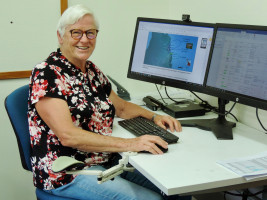 contributions to fruit breeding and was recently elected a Fellow of the International Society of Horticultural Science. In the 1990s, she became recognised internationally for her research into the growing field of marker-assisted fruit breeding. From this, she established a high-throughput technology platform that advances the targeted development of new apple and kiwifruit varieties, faster and more precisely. This platform is capable of delivering apple cultivars and rootstocks with a range of very specific characters desired by consumers and growers (including red colour, crisp and juicy fruit texture, as well as multiple pest and disease resistances), benefitting both the consumer and reducing impacts of horticultural production. Genetic markers for sex have enabled kiwifruit breeders to discard non-fruiting male seedlings prior to orchard planting, for the past 12 years. Her leading research in genetics and genomics of fruit crops has been the driving force in implementing molecular breeding practices in New Zealand’s horticultural research and breeding programmes. Her research is a major factor in New Zealand’s leading status in international apple and kiwifruit breeding and genomics. In her retirement, she continues to mentor young scientists and is engaged in a project to utilise molecular genetics to determine taxonomy and diversity in Rhododendron, to determine priorities for ex situ conservation.
contributions to fruit breeding and was recently elected a Fellow of the International Society of Horticultural Science. In the 1990s, she became recognised internationally for her research into the growing field of marker-assisted fruit breeding. From this, she established a high-throughput technology platform that advances the targeted development of new apple and kiwifruit varieties, faster and more precisely. This platform is capable of delivering apple cultivars and rootstocks with a range of very specific characters desired by consumers and growers (including red colour, crisp and juicy fruit texture, as well as multiple pest and disease resistances), benefitting both the consumer and reducing impacts of horticultural production. Genetic markers for sex have enabled kiwifruit breeders to discard non-fruiting male seedlings prior to orchard planting, for the past 12 years. Her leading research in genetics and genomics of fruit crops has been the driving force in implementing molecular breeding practices in New Zealand’s horticultural research and breeding programmes. Her research is a major factor in New Zealand’s leading status in international apple and kiwifruit breeding and genomics. In her retirement, she continues to mentor young scientists and is engaged in a project to utilise molecular genetics to determine taxonomy and diversity in Rhododendron, to determine priorities for ex situ conservation.
Distinguished Professor Neil Gemmell, University of Otago
Distinguished Professor Neil Gemmell is internationally renowned and 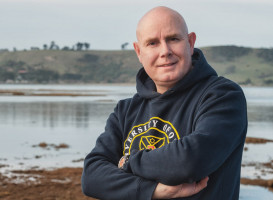 awarded for his contribution to genomics, evolutionary biology, conservation biology and reproductive biology. Throughout his research career, he has pioneered genetic approaches that have produced new tools to control the world’s most invasive species and enhance the conservation of some of the world’s rarest species, like whio and kakī. His research has also radically improved and increased understanding of New Zealand’s native and invasive fauna. He has enhanced genetic theory, particularly around the inheritance, evolution and functions of two common molecular genetic markers: mitochondrial DNA and microsatellites. His novel observation that mutations in the maternally inherited mitochondrial DNA affect only males and are not subject to natural selection, termed “Mother’s Curse”, helped spawn the new field of mitonuclear ecology and promising new forms of biocontrol. Neil’s work has also revealed the molecular orchestration of socially-controlled sex change in fish, among the most spectacular environmentally-induced transformations in nature, and new forms of post-mating sexual selection in fish. More recently, he successfully led the sequencing of the tuatara genome in partnership with Ngātiwai. He is recognised as the leading molecular evolutionist in New Zealand, and as a leading researcher internationally in ecological and evolutionary genetics. In 2020 he was awarded the Hutton Medal by Royal Society Te Apārangi.
awarded for his contribution to genomics, evolutionary biology, conservation biology and reproductive biology. Throughout his research career, he has pioneered genetic approaches that have produced new tools to control the world’s most invasive species and enhance the conservation of some of the world’s rarest species, like whio and kakī. His research has also radically improved and increased understanding of New Zealand’s native and invasive fauna. He has enhanced genetic theory, particularly around the inheritance, evolution and functions of two common molecular genetic markers: mitochondrial DNA and microsatellites. His novel observation that mutations in the maternally inherited mitochondrial DNA affect only males and are not subject to natural selection, termed “Mother’s Curse”, helped spawn the new field of mitonuclear ecology and promising new forms of biocontrol. Neil’s work has also revealed the molecular orchestration of socially-controlled sex change in fish, among the most spectacular environmentally-induced transformations in nature, and new forms of post-mating sexual selection in fish. More recently, he successfully led the sequencing of the tuatara genome in partnership with Ngātiwai. He is recognised as the leading molecular evolutionist in New Zealand, and as a leading researcher internationally in ecological and evolutionary genetics. In 2020 he was awarded the Hutton Medal by Royal Society Te Apārangi.
I am deeply humbled to be elected a Fellow of the Royal Society Te Apārangi. I thank those that supported my nomination and ultimately elected me. I also thank my family and friends for their unwavering support over my career to date, and the students, staff, collaborators, colleagues and mentors that I have worked with in New Zealand and across the globe – each of whom has aided and enhanced my science and my life. I also recognise the privilege I have had to pursue my scientific interest and curiosities and I thank the institutions, notably the University of Otago, and numerous funding bodies, that have supported both me and my work over the course of my career. I very much look forward to continuing the adventure of discovery and supporting a new generation of scientists in their quest to reveal the wonderful complexity of our natural world and, in particular, what makes Aotearoa New Zealand special.
Professor Gail Gillon (Ngāi Tahu Iwi), Founding Director of the University of Canterbury’s Child Well-being Research Institute, Co-Director of Better Start National Science Challenge: E Tipu E Rea
Professor Gail Gillon is a world-leading expert in spoken and written language
development. In particular, she studies the critical importance of phonological awareness (the ability to recognise and manipulate sounds within words) in facilitating reading and spelling success. She is an internationally recognised scholar in the area of early speech, language and reading development, and has made a substantial and lasting impact on the discipline of communication sciences and disorders. Her book Phonological Awareness from Research to Practice remains a leading text internationally in this area.
Professor Gillon’s research has resulted in transformation of both speech-language therapy and class teaching practices throughout the world. Her earlier successful intervention trials demonstrated how specific types of phonological processing instruction can rapidly accelerate the reading accuracy and reading comprehension abilities of children with dyslexia. She has also demonstrated through original research that it is possible to concurrently improve the speech intelligibility, reading and spelling of children who have speech sound disorders and who are at significant risk for persistent reading challenges. Her phonological awareness intervention materials that she developed for her research trials have been translated into a number of European languages.
Professor Gillon’s research, together with that of her colleagues, has culminated in the development of the Better Start Literacy Approach Te Ara Reo Matatini. This is a systematic and culturally responsive approach to advancing oral language, and early reading and writing success in our 5 and 6 year-old tamariki. The approach is currently being rolled out in new entrant and year 1 classes across New Zealand as part of the Ministry of Education’s Early Literacy Initiative. This impact from Professor Gillon’s research is positively enhancing the well-being of thousands of children and their whānau in Aotearoa New Zealand.
Professor Jarrod Haar, Ngāti Mahuta, Ngāti Maniapoto, Auckland University of Technology
Professor Jarrod Haar (Ngāti Mahuta, Ngāti Maniapoto) has an international 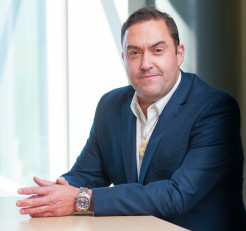 reputation as one of the foremost Māori scholars in business and management. Jarrod uses highly complex statistical methodologies to provide robust understandings of mātauranga Māori in contemporary New Zealand workplaces. This work has influenced national and international understandings of Indigenous cultural wellbeing in the modern workplace. Throughout his research career, he has demonstrated the advantages of incorporating Māori worldviews and practices into organisations that would typically exclude such suggestions. Much of the existing international literature on the participation of Indigenous peoples in the labour force takes a deficit-based approach, whereas Jarrod highlights the role of cultural wellbeing and collectivism in explaining Māori experiences of the workplace. Jarrod has made very substantial contributions to research which is relevant to both Māori and non-Māori employee wellbeing. His work on families and how to balance job and family demands is not only ground-breaking in a scientific sense, but of such practical importance to New Zealand and globally.
reputation as one of the foremost Māori scholars in business and management. Jarrod uses highly complex statistical methodologies to provide robust understandings of mātauranga Māori in contemporary New Zealand workplaces. This work has influenced national and international understandings of Indigenous cultural wellbeing in the modern workplace. Throughout his research career, he has demonstrated the advantages of incorporating Māori worldviews and practices into organisations that would typically exclude such suggestions. Much of the existing international literature on the participation of Indigenous peoples in the labour force takes a deficit-based approach, whereas Jarrod highlights the role of cultural wellbeing and collectivism in explaining Māori experiences of the workplace. Jarrod has made very substantial contributions to research which is relevant to both Māori and non-Māori employee wellbeing. His work on families and how to balance job and family demands is not only ground-breaking in a scientific sense, but of such practical importance to New Zealand and globally.
Professor Haar reminisces that the trajectory of his academic career started because his Master’s studies of Human Resource Management (HRM) were dominated by American firms and employees: I wanted to tell New Zealand stories. Happily, my American PhD supervisor obliged. As I became more experienced and able, I grew confident in bringing more aspects of the Māori world into the HRM field. I thought of it as educating the international HRM academe with some Māori and there are many positive lessons that workplaces could learn from Te Ao Māori.
I consider myself a Māori storyteller who shares the largely positive stories about Māori employees and employers. For me, the stories have been an exciting expedition through the interface between the Māori world and HRM; the interplay of culture and the work experience, Māori leadership, Māori cultural demands at work, and Māori career aspirations. While I am predominantly a quantitative researcher, I like to think that I am still a storyteller: one that uses numbers to reveal the story that lies beneath. Fundamentally, telling the Aotearoa New Zealand story of employees and firms helps showcase our distinctiveness to ourselves and to the world. The following whakataukī captures my intent:
He kano mātauranga whakatō, he hua mātauranga puta mai.
If the seed of knowledge is planted, the fruits of knowledge will emerge.
Garth Harmsworth, Te Arawa, Ngāti Tūwharetoa, Ngāti Raukawa, Principal Māori Researcher at Manaaki Whenua – Landcare Research
With 37 years of research leadership, Garth Harmsworth (Te Arawa, Ngāti
Tūwharetoa, Ngāti Raukawa) is renowned for his work building Māori research capability nationally, and advancing mātauranga-based kaupapa Māori and collaborative research practice. Garth’s research has directly unlocked the potential of Māori land, ensuring culturally relevant approaches and information-systems to support legislation, policy and statistics, and improve land management across Aotearoa. He engages with Māori landowners, organisations, iwi/hapū and government to bridge Western science and mātauranga Māori, while always ensuring the benefits of a te ao Māori worldview are captured. Throughout his research career, he has integrated Māori values for the natural environment into resource management decision-making, developed culturally appropriate indicators that reflect Māori land and freshwater values, and has advanced collaborative and kaupapa Māori research. His knowledge and understanding of catchment management from the tangata whenua has been ground-breaking in establishing sustainable development approaches. He has brought a te ao Māori perspective to a conventionally ‘biophysical’ science discipline, which now serves as a best practice guide for future land use within Aoteaora and across the globe.
Professor Rawinia Higgins Tūhoe, Deputy Vice-Chancellor (Māori) at Te Herenga Waka – Victoria University of Wellington
Professor Rawinia Higgins (Tūhoe) is highly esteemed for her work in Māori 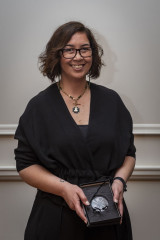 language revitalisation, particularly language planning and policy. Her research has advanced legislative change, public policy, government investment and strategy development in Aotearoa. Alongside her colleague, Professor Poia Rewi, she co-designed the Zero Passive Active (ZePA) Māori language revitalisation model, which identifies effect areas’ that allows planners, funders and deliverers of Māori language initiatives to be more specific and targeted in their approach. She chaired the Review of the Māori Language Bill, leading the extensive nationwide consultation process for Te Ture mō Te Reo Māori (The Māori Language Act 2016). Throughout this process, she engaged directly with Māori communities, incorporating their input in the final document. The resulting legislation was ground-breaking and reframed the policy landscape for the whole Māori language sector. Rawinia is the first woman to become Chair and Commissioner of the Te Taura Whiri i te Reo Māori, the Māori Language Commission and the youngest member to be appointed to the Waitaingi Tribunal. Building on her research, a 2020 initiative by Te Taura Whiri i te Reo Māori saw over 1 million New Zealanders take part in the ‘Māori Language Moment’ – the single largest celebration of te reo Māori in Aotearoa. Her scholarly contributions have made a significant impact in sharing new discourse, insights and understanding of mātauranga Māori and challenging cultural norms.
language revitalisation, particularly language planning and policy. Her research has advanced legislative change, public policy, government investment and strategy development in Aotearoa. Alongside her colleague, Professor Poia Rewi, she co-designed the Zero Passive Active (ZePA) Māori language revitalisation model, which identifies effect areas’ that allows planners, funders and deliverers of Māori language initiatives to be more specific and targeted in their approach. She chaired the Review of the Māori Language Bill, leading the extensive nationwide consultation process for Te Ture mō Te Reo Māori (The Māori Language Act 2016). Throughout this process, she engaged directly with Māori communities, incorporating their input in the final document. The resulting legislation was ground-breaking and reframed the policy landscape for the whole Māori language sector. Rawinia is the first woman to become Chair and Commissioner of the Te Taura Whiri i te Reo Māori, the Māori Language Commission and the youngest member to be appointed to the Waitaingi Tribunal. Building on her research, a 2020 initiative by Te Taura Whiri i te Reo Māori saw over 1 million New Zealanders take part in the ‘Māori Language Moment’ – the single largest celebration of te reo Māori in Aotearoa. Her scholarly contributions have made a significant impact in sharing new discourse, insights and understanding of mātauranga Māori and challenging cultural norms.
Professor Andrew Hill, University of Auckland, Assistant Dean in the Department of Surgery at the South Auckland Clinical Campus
Professor Andrew Hill has established an internationally recognised research 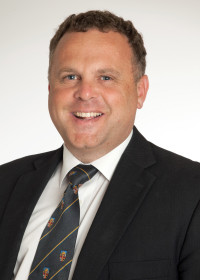 group in surgical peri-operative care (before, during and after surgery) and has made leading contributions to understanding the metabolic response to surgery. He is internationally renowned for his surgical specialty of colorectal surgery and gastrointestinal diseases. His innovative “two-wound hypothesis” has shown that in abdominal surgery, two wounds are made and both influence postoperative recovery and provide separate therapeutic targets. This has led to the use of intraperitoneal local anaesthetic (IPLA) which improves outcomes for patients after major surgery. His work with IPLA and preoperative steroids has now been incorporated into international surgical guidelines. Andrew has carried out more randomised trials than any other surgeon in New Zealand, through which he has made major discoveries on colectomy, abdominal surgery and postoperative recovery. He is the immediate past president of the International Society of Surgeons (ISS), where he worked to expand its reach and influence. He is currently leading the G4 global alliance taskforce, seeking to establish minimum standards for surgical care internationally, which is helping to optimise outcomes in resource-poor communities.
group in surgical peri-operative care (before, during and after surgery) and has made leading contributions to understanding the metabolic response to surgery. He is internationally renowned for his surgical specialty of colorectal surgery and gastrointestinal diseases. His innovative “two-wound hypothesis” has shown that in abdominal surgery, two wounds are made and both influence postoperative recovery and provide separate therapeutic targets. This has led to the use of intraperitoneal local anaesthetic (IPLA) which improves outcomes for patients after major surgery. His work with IPLA and preoperative steroids has now been incorporated into international surgical guidelines. Andrew has carried out more randomised trials than any other surgeon in New Zealand, through which he has made major discoveries on colectomy, abdominal surgery and postoperative recovery. He is the immediate past president of the International Society of Surgeons (ISS), where he worked to expand its reach and influence. He is currently leading the G4 global alliance taskforce, seeking to establish minimum standards for surgical care internationally, which is helping to optimise outcomes in resource-poor communities.
Professor Patria Hume, Auckland University of Technology
Professor Patria Hume is an international leader in sports performance and 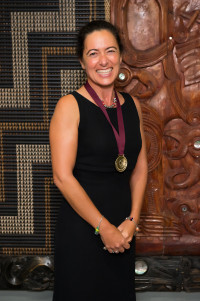 injury prevention. She is renowned for her work using evidence-based interventions to influence best-practice policy development that aims to reduce injury and improve sports techniques for athletes around the world. In 1999, Patria started SportSmart, a nationwide sports injury prevention programme for the Accident Compensation Corporation (ACC). Her collaborations with PhD students, industry partners and academics from many disciplines resulted in this programme being developed into sport-specific programmes. RugbySmart, for instance, was adopted as an annual compulsory programme for players and coaches, and resulted in a significant reduction in severe neck injuries. Her team pioneered the use of novel instrumentation to collect data on player head impacts during games and training in contact sports. She initiated the Global Rugby Health Research programme after her teams’ ground-breaking work with World Rugby and New Zealand Rugby, exploring the long-term health impacts of playing rugby. The research has indicated potential long term health consequences for head impacts and that sub-concussive head impacts need addressing. The results from these research projects have captured global attention and have helped transform concussion injury awareness and management in New Zealand and internationally.
injury prevention. She is renowned for her work using evidence-based interventions to influence best-practice policy development that aims to reduce injury and improve sports techniques for athletes around the world. In 1999, Patria started SportSmart, a nationwide sports injury prevention programme for the Accident Compensation Corporation (ACC). Her collaborations with PhD students, industry partners and academics from many disciplines resulted in this programme being developed into sport-specific programmes. RugbySmart, for instance, was adopted as an annual compulsory programme for players and coaches, and resulted in a significant reduction in severe neck injuries. Her team pioneered the use of novel instrumentation to collect data on player head impacts during games and training in contact sports. She initiated the Global Rugby Health Research programme after her teams’ ground-breaking work with World Rugby and New Zealand Rugby, exploring the long-term health impacts of playing rugby. The research has indicated potential long term health consequences for head impacts and that sub-concussive head impacts need addressing. The results from these research projects have captured global attention and have helped transform concussion injury awareness and management in New Zealand and internationally.
After being diagnosed with kidney failure at thirteen, beating the medical odds, representing New Zealand as a gymnast and coach, and now having a productive academic career as a sports scientist, it is an honour to be the first RSNZ elected Fellow in Sports Science.
I thank Dr Helen Pilmore and the Auckland Hospital renal transplant staff for “keeping me alive to 55” physically and emotionally so that I have been able to contribute to society.
I thank Dr Henry Duncan, retired Head of School of Sport and Recreation, AUT, and Derek McCormack, AUT Vice Chancellor. Their support since 2000, when I joined AUT, has enabled our research-education-community service nexus approach to enhance the way people can participate in sport.
I thank Professor Barry Wilson and Professor Will Hopkins for inspiring me to become a sports scientist. They provided me with opportunities to develop resilience and the ability to persevere in the face of academic challenges.
Thank you athletes, coaches and sport support staff for the opportunities to collaborate together as without you I could not be an applied sport scientist.
To my parents Alan and Lyn, sister Sheralyn, brother Jarrod, my partner of 38 years Trevor, wider whanau and work colleagues, thank you for your past and on-going support enabling me to be the best I can be. He waka eke noa (We’re in this together).
Professor Robert Jahnke ONZM, Ngai Taharora, Te Whānau a Iritekura, Te Whānau a Rakairo o Ngāti Porou, Whiti o Rehua School of Art, Massey University
Professor Robert Jahnke (Ngai Taharora, Te Whānau a Iritekura, Te Whānau a 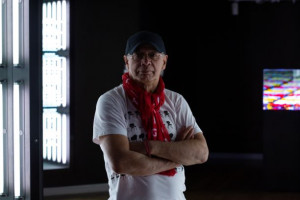 Rakairo o Ngāti Porou) is Aotearoa New Zealand’s most influential Māori visual arts educator and is a tireless ambassador for Māori and Indigenous art and culture. He is an internationally recognised artist, sculptor and designer. Robert has fundamentally altered national and international understanding of Māori art through his contributions to Māori visual culture and Indigenous arts scholarship. Over the last 30 years, he has challenged and celebrated conceptual and historical positions of Aotearoa society through his politically charged, but widely accessible art. Robert’s work is recognised as a key part of the contemporary Māori art movement, which explores the complex past, present and future implications of colonialism on Māori society. He is the founder and leader of the Toioho ki Āpiti Programme at Massey University, establishing the first bachelor of Māori visual arts at a time when no other Māori arts programme existed within universities. This programme has seen numerous undergraduate students and over 80 postgraduate completions, many of whom are now working at the forefront of contemporary Māori art. Toioho ki Āpiti is also recognised as a pioneering teaching programme integrating te reo Māori and tikanga Māori, supporting the growth of the Māori art movement in New Zealand. Robert’s notions of ‘trans-customary’ arts practice have expanded approaches to understanding how Indigenous arts are produced in national and international contexts. His work has raised the international profile of Māori art on the world stage, as well as highlighting critical issues faced by many Indigenous communities across the world. He was made an Officer of the New Zealand Order of Merit in 2017.
Rakairo o Ngāti Porou) is Aotearoa New Zealand’s most influential Māori visual arts educator and is a tireless ambassador for Māori and Indigenous art and culture. He is an internationally recognised artist, sculptor and designer. Robert has fundamentally altered national and international understanding of Māori art through his contributions to Māori visual culture and Indigenous arts scholarship. Over the last 30 years, he has challenged and celebrated conceptual and historical positions of Aotearoa society through his politically charged, but widely accessible art. Robert’s work is recognised as a key part of the contemporary Māori art movement, which explores the complex past, present and future implications of colonialism on Māori society. He is the founder and leader of the Toioho ki Āpiti Programme at Massey University, establishing the first bachelor of Māori visual arts at a time when no other Māori arts programme existed within universities. This programme has seen numerous undergraduate students and over 80 postgraduate completions, many of whom are now working at the forefront of contemporary Māori art. Toioho ki Āpiti is also recognised as a pioneering teaching programme integrating te reo Māori and tikanga Māori, supporting the growth of the Māori art movement in New Zealand. Robert’s notions of ‘trans-customary’ arts practice have expanded approaches to understanding how Indigenous arts are produced in national and international contexts. His work has raised the international profile of Māori art on the world stage, as well as highlighting critical issues faced by many Indigenous communities across the world. He was made an Officer of the New Zealand Order of Merit in 2017.
Professor Robin Kearns, Professor of Geography, University of Auckland
Robin Kearns has been a pioneer in the growing field of health geography that has increasingly embraced the wider contexts of health, health services and wellbeing. This field of geography links human wellbeing to the characteristics of place, such as how everyday practices such as walking, exposure natural areas, and the character of health clinics, can all influence wellbeing. He has worked at different scales including the home, neighbourhood and community, and has also interpreted various perspectives on place-based health experiences, ranging from new settlers, people with disabilities, older people and children in both urban and rural settings. Robin’s research has been internationally influential for both his new methodologies and theories. Working with not only fellow geographers but also public health practitioners and other social scientists, Robin is at the forefront of the sub-discipline of health geography. Through employing innovative qualitative methodologies, Robin’s case studies research has made visible the complexities of health-place relationships here in Aotearoa New Zealand.
A seat overlooking the sea in memory of my parents has inscribed “It’s all a big adventure”. As migrants, that saying reflected their seeking every opportunity to engage with the land that had attracted them. I am grateful for that inspiration. After an abysmal performance in high school Geography, I redeemed myself at university with A-grades in the subject. Why the difference? A life-changing student exchange in the U.S. After a rurally-focused MA thesis, my PhD in Canada on urban mental health issues set a career pattern: an inclination to be eclectic. On return to Auckland, links between housing and health were an initial focus but expanded with a partner in medicine and children whose lives generated interests such as walking school buses. Perhaps unsurprisingly, both now have Geography degrees. I thank my family for enduring my nocturnal writing habits and for almost anything being fair game for a scholarly article: The health geographer’s role is understanding the place of wellbeing as well as working for the wellbeing of places.
Research is a big adventure. To my mentors, collaborators and former postgraduate students: thank you. It takes a wide web of relationships to know our place in the world.
Dr Rangi Matamua (Tūhoe) is a pioneering Māori scholar who has 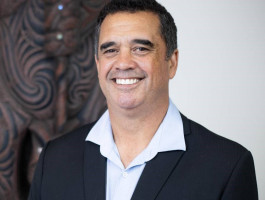 revolutionised understandings of Māori astronomy, and in particular Matariki. His research has been ground-breaking in terms of its contribution to mātauranga Māori; he has enlightened both national and international populations on the mātauranga of astronomy. He is renowned for his role communicating his research in an accessible and engaging way, and reaching both academic and non-academic audiences. Rangi is both the author of the bestselling book Matariki: The Star of the Year (published both in English and te reo editions) and presenter of the award winning te reo Māori web series Living by the Stars. He has challenged widespread misconceptions about Māori astronomy and has enhanced our understandings of a Māori world view of the stars. His research is situated at the interface between mātauranga Māori and Western science and he is helping to reconnect people with maramataka – the Māori lunar calendar – and the environment. Rangi is also part of a wider movement, reclaiming Indigenous astronomy as part of a continued process of decolonisation. He has won the 2019 Prime Minister’s Science Communication Prize and the 2020 Callaghan Medal for science communication from Royal Society Te Apārangi.
revolutionised understandings of Māori astronomy, and in particular Matariki. His research has been ground-breaking in terms of its contribution to mātauranga Māori; he has enlightened both national and international populations on the mātauranga of astronomy. He is renowned for his role communicating his research in an accessible and engaging way, and reaching both academic and non-academic audiences. Rangi is both the author of the bestselling book Matariki: The Star of the Year (published both in English and te reo editions) and presenter of the award winning te reo Māori web series Living by the Stars. He has challenged widespread misconceptions about Māori astronomy and has enhanced our understandings of a Māori world view of the stars. His research is situated at the interface between mātauranga Māori and Western science and he is helping to reconnect people with maramataka – the Māori lunar calendar – and the environment. Rangi is also part of a wider movement, reclaiming Indigenous astronomy as part of a continued process of decolonisation. He has won the 2019 Prime Minister’s Science Communication Prize and the 2020 Callaghan Medal for science communication from Royal Society Te Apārangi.
Professor Janet McLean QC, Professor of Law, University of Auckland
Professor Janet McLean is recognised across the British Commonwealth for
her multidisciplinary and incisive investigations of the powers and accountabilities necessary for good government. Interweaving public law, historical analysis, and philosophical thought, McLean has transformed colonial and contemporary understandings of the nature of the Crown in the United Kingdom and Aotearoa New Zealand, including in the Tiriti o Waitangi. She has acted as an advisor and expert witness to the New Zealand and Canadian governments, scrutinising the techniques by which human rights instruments have been given effect. McLean’s latest research reveals how government use of contractual mechanisms can undermine core constitutional principles while expanding executive power, and examines the constitutional underpinnings of the public service. In 2019, Professor McLean was appointed a Queen’s Counsel by prerogative for her “extraordinary and long-standing contribution to, and development of, the law”.
Professor Julian Paton, Director of Manaaki Mānawa - the Centre for Heart Research, University of Auckland
Julian Paton is a world-leading physiologist who has made outstanding 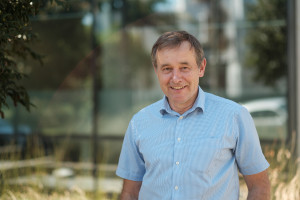 contributions to knowledge in the area of cardiovascular and respiratory control. He has pioneered new technical approaches surrounding neural control of circulation and breathing. His unique technical research and contribution of new scientific concepts in cardio-respiratory diseases has resolved a major controversy surrounding respiratory complications. Julian’s discoveries have had a significant impact on understanding how hypertension, heart failure and sleep apnoea develop and progress. This impact of his research has been recognised by technology transfer to partners who currently are working to create new therapeutic strategies for the treatment of these diseases, including a novel pacemaker called ‘brain on a chip’. His work has led to a spin out company (Ceryx Medical Ltd.), which he is a founder member and the chief scientific officer. Julian has seen his pioneering preclinical research studies progress into clinical trials, demonstrating his impact as a scientific leader in the search for new treatments and understandings of blood pressure control and heart disease. His work in different programmes with national and international collaborators, working in partnership with iwi, hāpu, whānau and aiga, has the aim of improving health outcomes, particularly for Māori and Pacific Peoples who are most affected by cardiac and respiratory diseases in Aotearoa New Zealand. Indeed, a fundamental goal of the new and recently funded Centre of Research Excellence - Healthy Hearts for Aotearoa New Zealand, which he co-Directs, is to improve equity for heart health research.
contributions to knowledge in the area of cardiovascular and respiratory control. He has pioneered new technical approaches surrounding neural control of circulation and breathing. His unique technical research and contribution of new scientific concepts in cardio-respiratory diseases has resolved a major controversy surrounding respiratory complications. Julian’s discoveries have had a significant impact on understanding how hypertension, heart failure and sleep apnoea develop and progress. This impact of his research has been recognised by technology transfer to partners who currently are working to create new therapeutic strategies for the treatment of these diseases, including a novel pacemaker called ‘brain on a chip’. His work has led to a spin out company (Ceryx Medical Ltd.), which he is a founder member and the chief scientific officer. Julian has seen his pioneering preclinical research studies progress into clinical trials, demonstrating his impact as a scientific leader in the search for new treatments and understandings of blood pressure control and heart disease. His work in different programmes with national and international collaborators, working in partnership with iwi, hāpu, whānau and aiga, has the aim of improving health outcomes, particularly for Māori and Pacific Peoples who are most affected by cardiac and respiratory diseases in Aotearoa New Zealand. Indeed, a fundamental goal of the new and recently funded Centre of Research Excellence - Healthy Hearts for Aotearoa New Zealand, which he co-Directs, is to improve equity for heart health research.
Growing up on a farm in the Quantock Hills in Somerset, England, I was fascinated by agriculture. Based on my school reports, I was no academic but good at practical subjects such as car mechanics. Somehow, I scraped into university to study biology, but hated it; I wanted to quit. Only through their persuasion did my parents convince me to persist. Then, I found my passion – physiology, or as I saw it, body mechanics.
My election to become a Fellow of the Royal Society Te Apārangi is a great day for physiology and is hugely flattering personally. It reflects the wisdom gleaned from those that trained me and the efforts of my incredibly gifted PhD students, post-doctoral scientists, research fellows and collaborators that make our research possible. I have been extremely fortunate to have career-long mentorship from my PhD supervisor, worked with such gifted people from around the world, from whom I learnt so much and am extremely grateful. My sincere thanks to all who funded me, my parents, and my wife and two children who have been so supportive as I have strived to be innovative, produce quality science that may one day improve medical treatments to combat cardiovascular disease.
Professor Steven Ratuva, Director, Macmillan Brown Centre for Pacific Studies, University of Canterbury
Steven Ratuva is at the forefront of interdisciplinary research globally on race 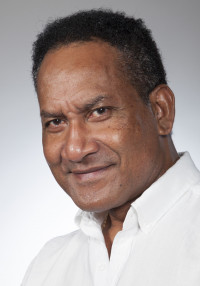 relations, global security, social protection for vulnerable groups, climate change and affirmative action for minorities. His leadership of international research teams and networks (such as the International Political Science Association research on global security amongst others) as well as various applied projects has contributed to redefining global security thinking and helped reshape understandings of ethnicity and conflict. Steven’s authoritative research on affirmative action in countries like Fiji, South Africa and Malaysia has provided a critical perspective on how affirmative action can be manipulated by elites to serve their economic and political interests at the cost of the poor. Fiji-born Steven has worked to promote critical minority research internationally and advocate for the importance of minority intellectual innovation which is often undermined by the reduction of knowledge into metrics, algorithm, ranking, use of social index or indexology (a term he coined) and commodification in a modern neoliberal context. He founded an interdisciplinary journal to support young Pacific researchers and he is also advisor and consultant for a number leading global and regional institutions and organizations. He is at the cutting-edge of interdisciplinary research by breaking down knowledge barriers and publishing in different disciplines such as sociology, anthropology, politics and development studies. In 2018 he was awarded a Fulbright Senior Fellowship for research at UCLA, Duke University and Georgetown University and in 2019 he was co-winner of the University of Canterbury research medal. In 2020 he was awarded the prestigious Metge Medal by the Royal Society Te Apārangi for research excellence, capacity building and leadership in the social sciences.
relations, global security, social protection for vulnerable groups, climate change and affirmative action for minorities. His leadership of international research teams and networks (such as the International Political Science Association research on global security amongst others) as well as various applied projects has contributed to redefining global security thinking and helped reshape understandings of ethnicity and conflict. Steven’s authoritative research on affirmative action in countries like Fiji, South Africa and Malaysia has provided a critical perspective on how affirmative action can be manipulated by elites to serve their economic and political interests at the cost of the poor. Fiji-born Steven has worked to promote critical minority research internationally and advocate for the importance of minority intellectual innovation which is often undermined by the reduction of knowledge into metrics, algorithm, ranking, use of social index or indexology (a term he coined) and commodification in a modern neoliberal context. He founded an interdisciplinary journal to support young Pacific researchers and he is also advisor and consultant for a number leading global and regional institutions and organizations. He is at the cutting-edge of interdisciplinary research by breaking down knowledge barriers and publishing in different disciplines such as sociology, anthropology, politics and development studies. In 2018 he was awarded a Fulbright Senior Fellowship for research at UCLA, Duke University and Georgetown University and in 2019 he was co-winner of the University of Canterbury research medal. In 2020 he was awarded the prestigious Metge Medal by the Royal Society Te Apārangi for research excellence, capacity building and leadership in the social sciences.
Dr Poia Rewi (Tūhoe, Ngāti Manawa, Te Arawa), Tumu Whakarae, Te Mātāwai
Poia Rewi is celebrated as one of the most active research specialists in Māori
culture, language revitalisation, oral history and performing arts. With his background being in second language teaching, he takes a socio-linguistic approach to teaching and aiding Māori language revitalisation. This involves the use of information technology, kapa haka practices and the adaptation of Western and Indigenous approaches to create transformative research outputs including publications, haka compositions and te reo Māori language apps. His contribution to new knowledge has generated new international linguistic practices. Poia co-designed with Professor Rawinia Higgins the Zero Passive Active Māori language revitalisation model that identifies effect areas’ that allows planners, funders and deliverers of Māori language initiatives to be more specific and targeted in their approach. This model has now been incorporated into policy and used to inform new legislation: Te Ture mo Te Reo Māori (Māori Language Act 2016) and has been implemented to accelerate the learning of te reo in schools. His research outputs have brought forward new knowledge in Aotearoa New Zealand that reflects Māori world views and has generated new practices in linguistics for Indigenous people internationally.
Poia is now affiliated to Te Mātāwai, who are a Government funded agency whose goal is to return the Māori language as the nurturing first language in the home “kia ūkaipō anō te reo”. A pivotal role is to act on behalf of iwi and Māori to a) provide leadership in promoting the well-being of te reo Māori on behalf of iwi, Māori, and communities and b) advise and support Crown initiatives to revitalise te reo Māori amongst other roles. Te mātāwai aims to support Māori language initiatives that result in increased whānau wellbeing, intergenerational transmission of the Māori language, Māori language domains; support grassroots Māori language activities and see the Māori language valued as part of ones identity.
Toeolesulusulu Damon Salesa, Associate Professor of Pacific Studies and Pro Vice-Chancellor (Pacific), University of Auckland
Toeolesulusulu Damon Salesa is renowned for his outstanding 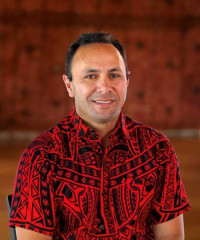 interdisciplinary contribution to Pacific Studies. His research examines the cultural, political and socio-economic obstacles Pacific peoples and cultures face, and he also highlights their creative and innovative responses. This has significantly contributed to interdisciplinary scholarship on the Pacific and public understanding of Pacific peoples’ issues. Damon is at the forefront of the analytical scholarship that positions Aotearoa New Zealand as a Pacific Island nation, rather than one separated historically, socially and politically. This work has radically challenged the idea that the Pacific is marginal rather than central to understanding New Zealand’s past, present and future. His research also contributes to different research areas that have failed to include the Pacific, such as Atlantic Studies and global history. Throughout his work, Damon has been proactive to ensure his research is accessible to the public, especially Pacific youth audiences. His book Racial Crossings was the 2012 winner of the Ernest Scott Prize, one of the major history prizes in Australia and New Zealand.
interdisciplinary contribution to Pacific Studies. His research examines the cultural, political and socio-economic obstacles Pacific peoples and cultures face, and he also highlights their creative and innovative responses. This has significantly contributed to interdisciplinary scholarship on the Pacific and public understanding of Pacific peoples’ issues. Damon is at the forefront of the analytical scholarship that positions Aotearoa New Zealand as a Pacific Island nation, rather than one separated historically, socially and politically. This work has radically challenged the idea that the Pacific is marginal rather than central to understanding New Zealand’s past, present and future. His research also contributes to different research areas that have failed to include the Pacific, such as Atlantic Studies and global history. Throughout his work, Damon has been proactive to ensure his research is accessible to the public, especially Pacific youth audiences. His book Racial Crossings was the 2012 winner of the Ernest Scott Prize, one of the major history prizes in Australia and New Zealand.
Professor Caroline Saunders ONZM, Director, Agribusiness and Economics Research Unit, Lincoln University
Caroline Saunders has made outstanding contributions to the advancement
of science by creating new knowledge in her research field of agriculture and economics. She initiated a transdisciplinary study that contributed to the ‘food miles’ debate, which argued that long distant food transport is unsustainable due to greenhouse gas emissions. This work has helped to inform other scientists, policy advisors and the public. In Caroline’s later work, she created a pilot survey to test if overseas consumers in developing markets are willing to pay a premium for attributes associated with New Zealand agri-food exports such as animal welfare, environmental sustainability and cultural authenticity. This work has led to a sustained and expanding research programme that has transformed New Zealand’s global agri-food value chains. Throughout her work she has been devoted to communicating her research. This has further advanced science and economics and their application both in New Zealand and internationally and has been influential for scientists, policymakers and the wider public. In 2009 she was made an Officer of the New Zealand Order of Merit.
I would like to thank the Royal Society for this award. I am deeply indebted to my family and the many people who have encouraged me over my career. I would in particular like to acknowledge my Whanau at the AERU these colleagues are part of my family and for the last twenty years we have been on many an adventure and journeys to reach our mission to exercise leadership in research for sustainable well-being.
Distinguished Professor Graham Hingangaroa Smith CNZM, Te Aitanga a Hauiti, Ngāti Apa, Ngāti Kahungunu and Ngāi Tahu. He is currently ‘Te Toi Ihorei ki Pūrehuroa’, The Distinguished Professor at Large, Massey University
Graham Hingangaroa Smith is a prominent Māori and Indigenous scholar who 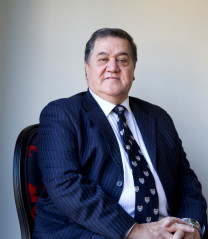 has been at the forefront of initiatives in Education and Māori Development. His research and practice have been foundational to the development of Kaupapa Māori theorizing and ‘transforming praxis’. As such his research is centred on developing theoretical and practical strategies that contribute to the political, social, economic and cultural advancement of Māori and indigenous communities. For example, he has made significant contributions to alternative schooling initiatives, including Te Kōhanga Reo, Kura Kaupapa Māori, and Whare Wānanga. The impact of his contribution is seen in the large number of public entities that now utilise Kaupapa Māori structures and practices. Graham’s work has created transdisciplinary research methods and theories that are being used extensively with other Indigenous peoples across the world, including Canada, USA (Hawaii and Alaska), Micronesia, Australia and Pacific nations. Graham oversaw the development of the only Māori Centre of Research Excellence – Ngā Pae o Te Māramatanga, which has seen more than 500 Māori PhD graduates who are now contributing greatly to their communities and aiding the self-development of Māori and Indigenous communities nationally and internationally. Graham holds two honorary doctorates from Canadian institutions, was elected a Fellow of the American Education Research Association in 2014 and also awarded a CNZM in 2014.
has been at the forefront of initiatives in Education and Māori Development. His research and practice have been foundational to the development of Kaupapa Māori theorizing and ‘transforming praxis’. As such his research is centred on developing theoretical and practical strategies that contribute to the political, social, economic and cultural advancement of Māori and indigenous communities. For example, he has made significant contributions to alternative schooling initiatives, including Te Kōhanga Reo, Kura Kaupapa Māori, and Whare Wānanga. The impact of his contribution is seen in the large number of public entities that now utilise Kaupapa Māori structures and practices. Graham’s work has created transdisciplinary research methods and theories that are being used extensively with other Indigenous peoples across the world, including Canada, USA (Hawaii and Alaska), Micronesia, Australia and Pacific nations. Graham oversaw the development of the only Māori Centre of Research Excellence – Ngā Pae o Te Māramatanga, which has seen more than 500 Māori PhD graduates who are now contributing greatly to their communities and aiding the self-development of Māori and Indigenous communities nationally and internationally. Graham holds two honorary doctorates from Canadian institutions, was elected a Fellow of the American Education Research Association in 2014 and also awarded a CNZM in 2014.
Ngā mihi maioha;
I would like to thank my peers for the recognition and particularly those who took the time to nominate me and my work. I would also acknowledge all of those colleagues who I have worked alongside and especially those who were also prepared to take the ‘road less travelled’; thanks also to my immediate whanau, friends and communities of interest who have supported over the years.
Professor Michelle Thompson-Fawcett, Ngāti Whātua, Professor at the School of Geography, University of Otago
Michelle Thompson-Fawcett is a world-leading expert in advancing 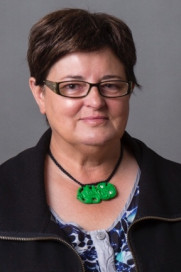 contemporary mātauranga Māori and fostering Indigenous approaches to culturally sustainable environmental futures. She is at the forefront of crafting Indigenous theories of power and space. Her research has demonstrated that settler-colonial planning systems persistently erase Indigenous procedures, cultures, values and science. The research has a provocative conceptual nature, a commitment to Indigenous methodologies, and a focus on issues of self-determination. Michelle’s work with Indigenous communities has generated pathways for holistic, integrated, intergenerational Indigenous approaches that recognise relationships, environmental interactions and treaty obligations. This valuable contribution has created space for opportunities in evolving Indigenous planning fields such as plan making, impact assessment, cultural landscape protection and papakāinga development. Michelle’s work with interdisciplinary researchers around the globe has been effective in providing a collective platform for Indigenous groups to communicate in the emerging international space of Indigenous planning and development.
contemporary mātauranga Māori and fostering Indigenous approaches to culturally sustainable environmental futures. She is at the forefront of crafting Indigenous theories of power and space. Her research has demonstrated that settler-colonial planning systems persistently erase Indigenous procedures, cultures, values and science. The research has a provocative conceptual nature, a commitment to Indigenous methodologies, and a focus on issues of self-determination. Michelle’s work with Indigenous communities has generated pathways for holistic, integrated, intergenerational Indigenous approaches that recognise relationships, environmental interactions and treaty obligations. This valuable contribution has created space for opportunities in evolving Indigenous planning fields such as plan making, impact assessment, cultural landscape protection and papakāinga development. Michelle’s work with interdisciplinary researchers around the globe has been effective in providing a collective platform for Indigenous groups to communicate in the emerging international space of Indigenous planning and development.
Professor Denise Wilson, Ngāti Tahinga, Professor Māori Health; Associate Dean Māori Advancement, Auckland University of Technology
Denise Wilson is a world-leading academic who is contributing new knowledge 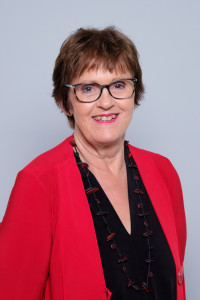 to support a positive transformation in wellbeing outcomes in Aotearoa, particularly for Māori. Focused on addressing low health care engagement and family violence, Denise’s interdisciplinary research, rooted in nursing, uses Māori-centred methodologies to enhance the quality of care that Māori people receive. Her work draws on traditional and contemporary mātauranga Māori knowledge, as well as Western research methods, to challenge existing practices and inspire new solutions. Denise’s research has been influential in reinvigorating cultural safety in the health and social sectors as it recognises the unique socio-historical contexts, consistent marginalisation and discrimination that contribute to detrimental social and health outcomes. Denise’s work with Māori and whānau has contributed to developing the Māori nursing workforce, and the Māori nursing leadership in a new cross-government agency approach to addressing family violence and sexual violence in New Zealand that involves prevention and intervention strategies. Her work is greatly contributing to efforts to reduce health disparities of Māori and other Indigenous people globally. In 2019 she was elected a Fellow of the American Academy of Nurses.
to support a positive transformation in wellbeing outcomes in Aotearoa, particularly for Māori. Focused on addressing low health care engagement and family violence, Denise’s interdisciplinary research, rooted in nursing, uses Māori-centred methodologies to enhance the quality of care that Māori people receive. Her work draws on traditional and contemporary mātauranga Māori knowledge, as well as Western research methods, to challenge existing practices and inspire new solutions. Denise’s research has been influential in reinvigorating cultural safety in the health and social sectors as it recognises the unique socio-historical contexts, consistent marginalisation and discrimination that contribute to detrimental social and health outcomes. Denise’s work with Māori and whānau has contributed to developing the Māori nursing workforce, and the Māori nursing leadership in a new cross-government agency approach to addressing family violence and sexual violence in New Zealand that involves prevention and intervention strategies. Her work is greatly contributing to efforts to reduce health disparities of Māori and other Indigenous people globally. In 2019 she was elected a Fellow of the American Academy of Nurses.
Ehara taku toa i te toa takitahi, engari he toa takitini
My achievements are not mine alone, but those of many.
As the eldest daughter of five raised by a single mother in the early 1970s, going to university was not an option. Thus, my pathway into research and academia juggled motherhood, work, and study. Early life experiences, including exposure to racism, discrimination, and violence, inspired me to make a difference for those often positioned on society's margins and rendered silent. The whakataukī above acknowledges that becoming a Fellow of the Royal Society Te Apārangi is not my achievement alone. It reflects the many people who have influenced my life, and notably, contributed to my achievements over the years. Too many to name and some who have passed, I am privileged to have each person in my life. They include my whānau, particularly my grandmothers, mother, partner, children and mokopuna. Many national and international academic, practice and community colleagues were also influential across my career, especially those who saw in me attributes I did not see in myself. And, importantly, those who willingly and kindly shared their stories to enable my career in research. Ngā mihi aroha ki a koutou katoa.
Professor Zhi-Qiang Zhang, Manaaki Whenua – Landcare Research and University of Auckland
Zhi-Qiang Zhang has made outstanding contributions to taxonomy in the 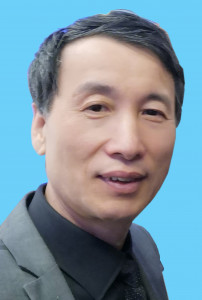 world. He has significantly advanced global taxonomy by founding and leading two of the largest international journals in biodiversity research: Zootaxa and Phytotaxa. Zootaxa is by far the most important journal in biodiversity discovery. These pioneering journals have greatly reduced barriers to global biodiversity description and changed the way taxonomy is communicated globally. Zhi-Qiang is a world-leading authority on the systematics and ecology of mites and has made outstanding global contributions to acarology. He has discovered and named over 150 new species of mites and wrote the first monograph on mites of greenhouses in the world, which is highly cited and has contributed to better pest control for greenhouse plants. He has also developed a series of identification keys and expert information documents for major groups of mites for the Ministry for Primary Industries. Due to the high frequency of mites existing in exported and imported produce, his work has greatly eased trade barriers and facilitated the import and export of fresh and stored produce.
world. He has significantly advanced global taxonomy by founding and leading two of the largest international journals in biodiversity research: Zootaxa and Phytotaxa. Zootaxa is by far the most important journal in biodiversity discovery. These pioneering journals have greatly reduced barriers to global biodiversity description and changed the way taxonomy is communicated globally. Zhi-Qiang is a world-leading authority on the systematics and ecology of mites and has made outstanding global contributions to acarology. He has discovered and named over 150 new species of mites and wrote the first monograph on mites of greenhouses in the world, which is highly cited and has contributed to better pest control for greenhouse plants. He has also developed a series of identification keys and expert information documents for major groups of mites for the Ministry for Primary Industries. Due to the high frequency of mites existing in exported and imported produce, his work has greatly eased trade barriers and facilitated the import and export of fresh and stored produce.
张智强博士1963年出生于中国上海;1985年获复旦大学生物系动物学学士学位;1993年初获美国康奈尔大学昆虫学博士学位;1992年至1994年完成美国俄勒冈州立大学昆虫系博士后研究;1994年至1999年任国际昆虫学研究所(暨英国自然历史博物馆昆虫学系)分类学家; 1995年至1999年兼任复旦大学生命科学学院教授;1998年至1999年兼任国际生物网秘书处技术总主管;1999年至今任新西兰皇家研究院土地环境保护研究所终身研究员;2006年至今任《国际动物命名委员会》委员;2013年至今任新西兰奥克兰大学教授;2020年在新西兰皇家学会院士院(The Academy of the Royal Society of New Zealand)增选院士中当选院士。张智强博士对振兴濒危学科分类学做出了杰出贡献。他创办和主编了生物多样性研究领域内两份最大的国际期刊《动物分类单元》(Zootaxa)和《植物分类单元》(Phytotaxa), 并以此极大地推动了分类学在全球范围内的进步。这些开创性的期刊显著地减少了描述全球生物多样性的障碍,也改变了全球分类学的交流方式。张智强博士是螨类系统和生态学方面世界领先的权威,为蜱螨学在全球的发展做出了卓越的贡献。他著有专著和编著20余部、学术论文300余篇。他发现并建立了螨类5个科级分类新单元、10余个属级分类新单元、150余个种级分类新单元。2003年他独立创作的专著《温室螨类:鉴定,生物学和防治》(Mites of Greenhouses: Identification, Biology & Control)被广泛引用并促进了温室植物害虫被有效控制。
HONORARY FELLOWS
Professor Penelope Brothers FRSC, Director of the Research School of Chemistry, Australian National University
Professor Penelope Brothers has achieved high distinction in chemistry 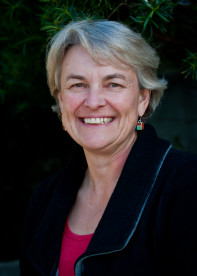 research through fundamental discoveries that have had significant positive impacts in energy capture, toxic metal encapsulation, chemical sensors, and drug discovery. In particular, her research has shifted fundamental understanding of how an important class of molecules form bonds and drive chemical reactions. Porphyrins and their chemical cousins are the active sites in key biological molecules, including haemoglobin for carrying oxygen in blood and chlorophyll in photosynthesis. These naturally-occurring complexes contain iron or magnesium, but Penny has expanded this chemistry to explore complexes with other elements, such as light non-metals (lithium, boron, phosphorus) and heavy metals (gold, antimony, bismuth). In particular, her work on boron porphyrins is unique and known for the unexpected structures and chemical reactivity she discovered. Following a 30-year career at the University of Auckland, she was appointed Director of the Research School of Chemistry at the Australian National University in 2019. However, she continues to have a strong connection to New Zealand through her continuing position at the University of Auckland, as a Principal Investigator at the MacDiarmid Institute, and by serving on the Marsden Fund Council. In 2007 she was elected a Fellow of the Royal Society of Chemistry, UK.
research through fundamental discoveries that have had significant positive impacts in energy capture, toxic metal encapsulation, chemical sensors, and drug discovery. In particular, her research has shifted fundamental understanding of how an important class of molecules form bonds and drive chemical reactions. Porphyrins and their chemical cousins are the active sites in key biological molecules, including haemoglobin for carrying oxygen in blood and chlorophyll in photosynthesis. These naturally-occurring complexes contain iron or magnesium, but Penny has expanded this chemistry to explore complexes with other elements, such as light non-metals (lithium, boron, phosphorus) and heavy metals (gold, antimony, bismuth). In particular, her work on boron porphyrins is unique and known for the unexpected structures and chemical reactivity she discovered. Following a 30-year career at the University of Auckland, she was appointed Director of the Research School of Chemistry at the Australian National University in 2019. However, she continues to have a strong connection to New Zealand through her continuing position at the University of Auckland, as a Principal Investigator at the MacDiarmid Institute, and by serving on the Marsden Fund Council. In 2007 she was elected a Fellow of the Royal Society of Chemistry, UK.
Penny Brothers attributes her success to growing up in a supportive family where pursuit of science was encouraged, to the many teachers, mentors, colleagues and collaborators in NZ around the world with whom she has worked, and to the University of Auckland, the Marsden Fund, the MacDiarmid Institute and Fulbright NZ for funding and for creating a stimulating and rewarding work environment. Most of all she is grateful to her own family for their support, and to the many generations of research students and postdoctoral fellows who have carried out the hard work at the bench that is the essence of research in chemistry.
Laureate Professor Ravendra (Ravi) Naidu, Global Innovation Chair, University of Newcastle and founding Managing Director and CEO of the Cooperative Research Centre for the Contamination Assessment and Remediation of the Environment (CRC CARE)
Ravendra (Ravi) Naidu has been revolutionary in the field of environmental 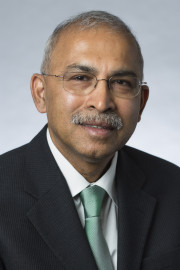 contamination and remediation. Following his doctorate in soil chemistry at Massey University, he has achieved scientific breakthroughs on how contaminants threaten the health and wellbeing of hundreds of millions of people and ecosystems globally. He has opened up many avenues for higher levels of multidisciplinary research and has revolutionised the way policymakers in Australia and New Zealand approach contamination and remediation. Ravi has demonstrated outstanding leadership in his field through the links he has created between international universities, and by leading the multidiscipline Masters course on Environmental Risk Assessment and Remediation in Australia, which is the only course of its kind. His pioneering work on contaminant bioavailability (the ability of contaminants to be absorbed by the body) led to the first issue of Geoderma (1997), an international journal dedicated to contaminants. These findings have led to new analytical methods in research and policy guidelines surrounding the management of contaminated soils. Ravi has been a global leader in bringing industry, government and research together to tackle the issue of contamination to protect future generations. He has been elected Fellow of the American Societies of Agronomy and Soil Science.
contamination and remediation. Following his doctorate in soil chemistry at Massey University, he has achieved scientific breakthroughs on how contaminants threaten the health and wellbeing of hundreds of millions of people and ecosystems globally. He has opened up many avenues for higher levels of multidisciplinary research and has revolutionised the way policymakers in Australia and New Zealand approach contamination and remediation. Ravi has demonstrated outstanding leadership in his field through the links he has created between international universities, and by leading the multidiscipline Masters course on Environmental Risk Assessment and Remediation in Australia, which is the only course of its kind. His pioneering work on contaminant bioavailability (the ability of contaminants to be absorbed by the body) led to the first issue of Geoderma (1997), an international journal dedicated to contaminants. These findings have led to new analytical methods in research and policy guidelines surrounding the management of contaminated soils. Ravi has been a global leader in bringing industry, government and research together to tackle the issue of contamination to protect future generations. He has been elected Fellow of the American Societies of Agronomy and Soil Science.
Ravi and his six siblings were born in Fiji and grew up on a sugar cane farm, where his family also planted rice in the wet season. As a young man, Ravi’s father, Paidaiya, worked in a mine from 4am to 8pm. Witnessing this backbreaking work motivated Ravi to learn as much as he could so that he could create a better life for himself and his future family. Tragically, Ravi’s parents passed away before their time, leaving him as head of the family at just 21 years old.
Ravi’s good grades at school gained him entry into the University of the South Pacific in Suva, 180 km from his home. In 1972, tragedy struck again when Cyclone Bebe destroyed the family farm. At this point Ravi was convinced that education was the only way to a secure a future for himself and his siblings. Inspired by a senior colleague at the University, he began to pursue research into soils, even though he never really wanted to be involved with ‘dirt’ again, after a hard life on the farm. But by then he had learned that funding comes to those who can best explain the benefits of their research to society.
For all his all his achievements, Ravi credits his humble beginnings in Fiji – and particularly the lessons he learnt from his father – for the success he has enjoyed over his stellar career.
Note: These Fellows are the 2020 cohort as they were elected following the 2020 selection process.
